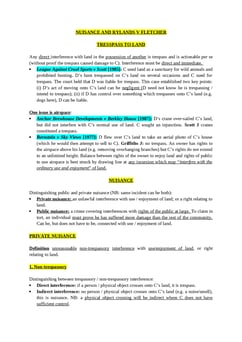Judgement for the case Re Polemis
Table Of Contents
Defendant chartered a ship from S and because of the negligence of one of the stevedores employed by Defendant, a plank of wood was dropped, causing the cargo (petrol) to ignite and destroy the ship.
It was held that even though the dropping of the plank causing a spark and in turn a fire could not reasonably have been anticipated by Defendant, Defendant was nevertheless liable for the acts of its servants.
Bankes LJ
The damage was “direct”
Warrington LJ
The presence or absence of reasonable anticipation of damage determines the legal quality of the act as negligent or innocent. If it be thus determined to be negligent, then the question whether particular damages are recoverable depends only on the answer to the question whether they are the direct consequence of the act.
Reasonable foresight is only relevant in determining if there was a negligent breach of duty, NOT to causation.
Scrutton LJ
Once the act is negligent, the fact that its exact operation was not foreseen is immaterial.
For Further Study on Re Polemis
Need instant answers? Our AI exam tutor is here to help.
Ask questions 🙋 Get answers 📔 It's simple 👁️👄👁️
Our AI is educated by the highest scoring students across all subjects and schools. Join hundreds of your peers today.
Get StartedSimilar Cases
Related Product Samples
These product samples contain the same concepts we cover in this case.

 Since 2010, Oxbridge Notes has been a trusted education marketplace, supplying high-quality materials from top achievers at universities like Oxford, Cambridge, LSE, Harvard, and Yale.
Since 2010, Oxbridge Notes has been a trusted education marketplace, supplying high-quality materials from top achievers at universities like Oxford, Cambridge, LSE, Harvard, and Yale.